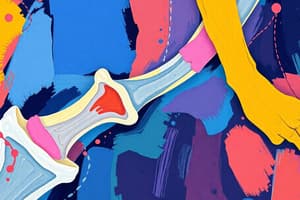Podcast
Questions and Answers
Which of the following best describes a cause of fluid excess?
Which of the following best describes a cause of fluid excess?
- Inadequate intake of fluids
- Increased sodium retention (correct)
- Excessive sweating
- Increased cellular metabolism
What is a common clinical manifestation of hyperkalemia?
What is a common clinical manifestation of hyperkalemia?
- Ketonuria
- Hypotension
- Increased urination
- Muscle weakness (correct)
During which phase of acute kidney injury (AKI) would you expect metabolic waste products to accumulate in the blood?
During which phase of acute kidney injury (AKI) would you expect metabolic waste products to accumulate in the blood?
- Prerenal phase
- Oliguric phase (correct)
- Initiation phase
- Recovery phase
Which statement accurately reflects a key difference between Crohn's disease and ulcerative colitis?
Which statement accurately reflects a key difference between Crohn's disease and ulcerative colitis?
What is a primary goal of treatment in a patient with peritonitis?
What is a primary goal of treatment in a patient with peritonitis?
What is a primary symptom of osteoporosis that can often go unnoticed until a fracture occurs?
What is a primary symptom of osteoporosis that can often go unnoticed until a fracture occurs?
What is the most likely complication in a post-operative ORIF patient experiencing one-sided lower extremity pain and redness?
What is the most likely complication in a post-operative ORIF patient experiencing one-sided lower extremity pain and redness?
Which of the following is a recommended practice for improving sleep hygiene?
Which of the following is a recommended practice for improving sleep hygiene?
Which treatment is commonly used for managing symptoms of obstructive sleep apnea?
Which treatment is commonly used for managing symptoms of obstructive sleep apnea?
What is a critical nursing consideration when caring for a patient on TPN (Total Parenteral Nutrition)?
What is a critical nursing consideration when caring for a patient on TPN (Total Parenteral Nutrition)?
Which factor can negatively impact wound healing significantly?
Which factor can negatively impact wound healing significantly?
In managing refeeding syndrome, which of the following is crucial for preventing complications?
In managing refeeding syndrome, which of the following is crucial for preventing complications?
What is a common lab value that indicates nutritional status, specifically related to protein levels in the body?
What is a common lab value that indicates nutritional status, specifically related to protein levels in the body?
Flashcards
Hypo/Hyper/Isotonic Fluids
Hypo/Hyper/Isotonic Fluids
Types of intravenous fluids used to treat fluid imbalances. Each type has a different concentration of solutes compared to blood.
Fluid Deficit (Causes)
Fluid Deficit (Causes)
Conditions that lead to the loss of fluids in the body. Can include excessive urination, vomiting, diarrhea, or significant bleeding.
Fluid Excess (Causes)
Fluid Excess (Causes)
Conditions associated with too much fluid in the body, potentially due to kidney malfunction or excess intake of fluids.
Hyperkalemia Treatment
Hyperkalemia Treatment
Signup and view all the flashcards
AKI (Acute Kidney Injury) Causes
AKI (Acute Kidney Injury) Causes
Signup and view all the flashcards
Types of fractures
Types of fractures
Signup and view all the flashcards
Osteoporosis
Osteoporosis
Signup and view all the flashcards
Post-op ORIF lower extremity pain/redness
Post-op ORIF lower extremity pain/redness
Signup and view all the flashcards
Compartment syndrome
Compartment syndrome
Signup and view all the flashcards
Patient Education- Pre-op, Post-op, and discharge
Patient Education- Pre-op, Post-op, and discharge
Signup and view all the flashcards
DVT (Deep Vein Thrombosis)
DVT (Deep Vein Thrombosis)
Signup and view all the flashcards
Sleep Apnea
Sleep Apnea
Signup and view all the flashcards
Parenteral & Enteral Feedings
Parenteral & Enteral Feedings
Signup and view all the flashcards
Study Notes
Bone Disorders
- Types of fractures (matching)
- Osteoporosis
- Osteomyelitis
- Gout
- Compartment Syndrome
- Deep vein thrombosis (DVT)
- Rhabdomyolysis
- Case study: Post-op ORIF patient with one-sided lower extremity pain and redness (10 points)
- Identify the complication (1 point).
- List 3 nursing interventions to address prior to calling the provider (3 points).
- Write a SBAR report for the provider (6 points).
Perioperative Care
- Patient education (pre-op, post-op, discharge instructions)
- Smoking cessation
- Concerning signs/symptoms prior to surgery
- Discharge teaching timing
- Prevention and management of post-op complications (e.g., pneumonia, DVTs)
- IV and oral medications for pain management
- Informed consent (when to send to surgery vs surgeon visit).
Sleep
- Sleep apnea: signs and symptoms, treatments (CPAP and non-CPAP)
- Sleep deprivation: signs and symptoms
- Sleep hygiene: best practices for improving sleep
- Bonus question: HR changes in age/fitness levels (additional information on heart rate changes associated with age or fitness levels)
Nutrition
- Nursing considerations for patients on parenteral and enteral feedings
- Patient safety concerns
- Parenteral nutrition (PPN) vs total parenteral nutrition (TPN) vs tube feeds
- Metabolic syndrome
- Lab values/diagnostic studies (fasting glucose, vital signs)
- Labs that link to nutritional status (signs and symptoms of low albumin levels)
Skin
- Refeeding syndrome
- Sunscreen guidance and recommendations
- Wound healing (how smoking impacts healing)
- Role of the skin in general
- Signs/symptoms of atopic dermatitis
Fluid and Electrolytes
- Difference between hypo/hyper/isotonic fluids
- Types of IV Fluids (reference last two pages, Electrolyte Quick Reference Guide in D2L)
- Clinical manifestations and causes for hypo/hyper (reference Electrolyte Quick Reference Guide in D2L)
- Treatment for hyperkalemia
- Causes of fluid deficit and excess (reference Fluid Imbalance Study Guide in D2L)
- Deficit=loss of fluid
Renal
- Labs that link to kidney function and expected lab findings in Chronic Kidney Disease (CKD)
- Causes of the types of acute kidney injury (AKI)
- Clinical manifestations of each phase for AKI
- Stages of Chronic Kidney Disease (CKD)
- Causes of uric acid kidney stones
- Medications for chronic kidney disease (information from PowerPoint)
- Contraindications for medications
- Assessment data prior to med administration. (lab results and/or physical assessment)
GI (Gastrointestinal)
-
Incontinence (difference between types, treatment options, nursing considerations, nursing interventions)
-
Lower vs Upper GI bleeds: assessment findings with fluid volume deficit (select all that apply)
-
Priority interventions in a patient with a new GI bleed
-
Crohn's disease, Ulcerative Colitis
-
Fistulas
-
GI bleed
-
GERD: medications/treatments (H2 blockers and PPIs – how they work)
- Peritonitis: treatments (priority)
- Peptic ulcer disease: medications to avoid, risk factors/causes
- Case study: Applying ADPIE to a patient with abdominal pain (10 points)
- Identify the GI problem (1 point).
- Identify expected elevated lab value (1 point).
- Diagnostic studies to determine cause of pain (1 point) - interventions/treatments for this patient (6 points) - anticipate occurring if untreated (1 point)
Studying That Suits You
Use AI to generate personalized quizzes and flashcards to suit your learning preferences.




